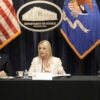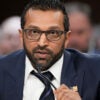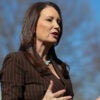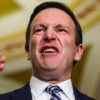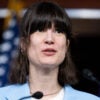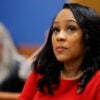When Hunter Biden was on the board of the Ukrainian oil and gas company Burisma, he was included on an official government email in 2016 to his father, then-Vice President Joe Biden, regarding a phone call with Ukraine’s leader at the time, according to a recent discovery reported in the New York Post.
But as detailed in my 2020 book “Abuse of Power,” the various business dealings of now-President Joe Biden’s son were not limited to the Ukrainian energy company.
Hunter Biden’s now-infamous laptop, which came to the public’s attention last year, contains 10 email messages from May and June of 2016 from a staffer for Biden, sent to the then-vice president and copied to Hunter.
The Daily Signal depends on the support of readers like you. Donate now
One such message, from May 26, was a schedule citing a “8.45am prep for 9am phone call with Pres Poroshenko,” as reported July 23 by the New York Post, a reference to then-Ukrainian President Petro Poroshenko.
Both the president and his son repeatedly have said they never discussed the son’s private business deals.
What follows are adapted excerpts from “Abuse of Power,” explaining the business dealings of the younger Biden and other family members.
* * *
Hunter Biden and his uncle and Joe’s brother, James Biden, bought the hedge fund Paradigm Global Advisors in the summer of 2006. James Biden reportedly told employees on the first day, “Don’t worry about investors. We’ve got people all around the world who want to invest in Joe Biden.”
In this instance, they were referring to the ranking member of the Senate Foreign Relations Committee, in an election year where Democrats were expected to retake the Senate, making Biden the chairman. An executive told Politico that James Biden viewed this as a legal way around campaign finance laws. James and Hunter Biden denied the comments reported by Politico.
James and Hunter Biden’s former business partner Joseph Lotito alleged in a January 2007 lawsuit that he was cut out of the purchase of the Ukraine hedge fund.
The complaint says that then-Sen. Joe Biden wanted Hunter Biden to find a different line of work because his presidential campaign would be greatly complicated if he remained the father of a Washington lobbyist, the newspaper Madison/St. Clair Record reported in 2008.
However, Hunter had said he didn’t lobby his father, and the senator’s son and brother countersued Lotito claiming he misrepresented his credentials. Biden’s Senate office told The Washington Post: “It is apparent that Mr. Lotito is only invoking Senator Biden’s name to garner media attention.”
Two days after the Lotito lawsuit, Biden announced his candidacy for the 2008 Democratic presidential nomination. Less than two weeks later, Hunter Biden resigned as interim chief executive of Paradigm Global Advisors but remained in his position as chairman of Paradigm’s advisory board.
In July 2007, Biden’s flagging presidential campaign hired his son’s lobbying firm, Oldaker, Biden & Belair LLP for $20,256, and eventually paid the firm $143,000 by the end of the failed campaign when Biden dropped out after winning less than 1% in the Iowa caucuses.
The good news for the Biden family outweighed the bad news later that year. A month after a scathing audit of the Paradigm finances, Sen. Barack Obama tapped Sen. Biden as his running mate. The following month, Hunter Biden dropped his lobbying work.
Just more than a month after Obama and Biden were elected, James and Hunter Biden reached a settlement with Lotito, dropping both the lawsuit and countersuit. But in February 2009, one of the Paradigm partners was charged with fraud.
The Obama Justice Department eventually determined that the owners of the skyscraper that rented space to Paradigm had tried to help Iran evade sanctions. In 2010, James and Hunter Biden bailed out on the investment and filed for voluntary liquidation.
Combining two well-connected families, Hunter Biden teamed with Christopher Heinz, the stepson to then-Sen. John Kerry, to start Rosemont Seneca. A third partner in the firm was Devon Archer, who the two knew from Yale. …
Rosemont Seneca set up an office in Washington, located close to both Biden’s residence at the Naval Observatory and to Teresa Heinz Kerry’s 23-room mansion in Georgetown, Peter Schweizer wrote in his book “Secret Empires: How the American Political Class Hides Corruption and Enriches Family and Friends.”
The firm grew in international clout as Vice President Biden and especially Secretary of State John Kerry were involved in shaping foreign policy.
Hunter met in 2012 with Jonathan Li, the head of Chinese private-equity fund Bohai Capital (BHR), and formed a partnership with Rosemont. In establishing BHR, Schweizer added, “the Chinese government was literally funding a business that it co-owned along with the sons of two of America’s most powerful decision-makers.”
After Obama-Biden were well into their second terms, Hunter Biden flew on Air Force Two with his father to China on Dec. 4, 2013. The vice president met with Chinese President Xi Jinping. Hunter also arranged for Li to meet his father.
Less than two weeks after Li met the vice president, Hunter’s Rosemont firm nailed a $1 billion private equity deal with a subsidiary of the Bank of China, Schweizer reported. Bohai Capital told The New Yorker in a piece published in July 2019 that the deal was signed before the meeting with the vice president.
That October, drawing close to another Chinese firm, Hunter bought a 10% financial stake valued at $430,000 in BHR.
The Intercept reported in May 2019 that Hunter’s firm BHR in China invested in Face++, a company that develops facial-recognition software for the nation’s communist government. The technology allowed China’s law enforcement to have “daily access to data detailing the religious activity, blood type, and even the amount of electricity used by ethnic minority Muslims living in the western province of Xinjiang.”
In late 2016, as his father’s two terms as vice president were winding down, Hunter Biden met with Ye Jianming, owner of CEFC China Energy, a firm closely aligned to the Chinese government. By May 2017, well into the new Trump administration, Hunter and Ye met again in Miami to “identify investment opportunities for Ye’s company CEFC China Energy in liquified natural gas projects in the United States.”
Ye sent a 2.8-carat diamond to Hunter. The value was disputed in Hunter’s divorce proceeding with his ex-wife Kathleen Biden. Hunter said the diamond was worth $10,000, while Kathleen argued it was worth $80,000. …
Seeing trouble, Christopher Heinz bailed out of Rosemont Seneca in 2015. The third partner in Rosemont Seneca, Devon Archer, was convicted in June 2018 of securities fraud charges, but the conviction was overturned and a new trial was ordered.
Archer actually joined the board of Burisma at the same time as Hunter Biden. …
It was in April 2014 that Hunter became a board member for Burisma with at least $50,000 per month compensation, and $83,000 by some accounts.
The board appointment for someone who had no experience in the energy industry or in Ukraine came just months after Hunter was discharged from the U.S. Navy Reserves after testing positive for cocaine.
Burisma’s board chairman, Alan Apter, said, “This is totally based on merit.” Apter added: “The company’s strategy is aimed at the strongest concentration of professional staff and the introduction of best corporate practices, and we’re delighted that Mr. Biden is joining us to help us achieve these goals.”
A Burisma press release said Hunter Biden would “be in charge of the holdings’ legal unit and will provide support for the company among international organizations.” Hunter denied that he was ever involved in the company’s legal affairs.
Hunter later said in a statement when questions emerged, “At no time have I discussed with my father the company’s business, or my board service, including my initial decision to join the board.”
Hunter joined the board during Britain’s investigation into Burisma. The British Serious Fraud Office prohibited Burisma owner Mykola Zlochevsky, Burisma Holdings, and other company officials from having access to the $23 million in London-based accounts.
However, a British court ordered the Serious Fraud Office in 2015 to unfreeze the assets after the Ukrainian prosecutor general’s office declined to cooperate with British law enforcement or provide documents. After that the unfrozen money was moved to Cyprus. …
Career State Department official George Kent, the deputy assistant secretary of state for European and Eurasian affairs, later told House impeachment investigators he raised concerns about the vice president’s son serving on the Burisma board. However, he was turned away.
“Subsequent to me going into the deputy prosecutor general on February 3, and demanding who took the bribe and how much was it to shut the case against Zlochevsky, I became aware that Hunter Biden was on the board. I did not know that at the time,” Kent told the three House committees during his October 15 closed-door deposition, according to the transcript.
“And when I was on a call with somebody on the vice president’s staff—and I cannot recall who it was—just briefing on what was happening [in] Ukraine, I raised my concerns that I had heard that Hunter Biden was on the board of a company owned by somebody that the U.S. government had spent money trying to get tens of millions of dollars back and that could create the perception of a conflict of interest,” Kent added.
Kent’s conversation was with a staffer from Vice President Biden’s office in either January or February 2015.
Kent recalled, “The message that I recall hearing back was that the vice president’s [other] son Beau was dying of cancer and that there was no further bandwidth to deal with family-related issues at that time.” …
In early 2016, Ukrainian authorities raided Zlochevsky’s home, indicating the country’s Burisma probe was escalating.
Records from the Obama White House show that Biden spoke to Poroshenko on Feb. 11, 18, and 19 of 2016. We don’t know what was said in each of the calls. The White House regularly issues “readouts” of calls with foreign leaders. … [T]he readout of the Feb. 18 call did say, “The Vice President also commended President Poroshenko’s decision to replace Prosecutor General [Viktor] Shokin, which paves the way for needed reform of the prosecutorial service.”
Also in February [2016], Karen Tramontano of Blue Star Strategies [a firm representing Burisma in the United States] was in direct contact with Undersecretary of State Catherine A. Novelli, who oversaw energy issues. Tramontano was seeking to set up a meeting.
The Burisma representative asked for a meeting with the undersecretary about ending the corruption allegations, according to emails obtained through a Freedom of Information Act lawsuit by journalist and commentator John Solomon.
The Burisma contact specifically mentioned Hunter Biden’s name in the email message with the subject line “Burisma.” …
The notes, first reported by Fox News, add: “President of Ukraine Petro Poroshenko told Mr. Shokin not to investigate Burisma, as it was not in the interest of Joe and/or Hunter Biden.”
“Mr. Shokin was called into Mr. Poroshenko’s office and told that the investigation into Burisma and the Managing Director, where Hunter Biden is on the board, has caused Joe Biden to hold up one billion dollars in U.S. aid to Ukraine,” the notes say.
Have an opinion about this article? To sound off, please email letters@DailySignal.com and we’ll consider publishing your edited remarks in our regular “We Hear You” feature. Remember to include the url or headline of the article plus your name and town and/or state.
